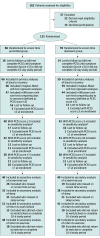Effect of Screen Time on Recovery From Concussion: A Randomized Clinical Trial
- PMID: 34491285
- PMCID: PMC8424526
- DOI: 10.1001/jamapediatrics.2021.2782
Effect of Screen Time on Recovery From Concussion: A Randomized Clinical Trial
Abstract
Importance: There are limited data to guide screen time recommendations after concussion.
Objective: To determine whether screen time in the first 48 hours after concussion has an effect on the duration of concussive symptoms.
Design, setting, and participants: This randomized clinical trial was conducted in the pediatric and adult emergency departments of a tertiary medical center between June 2018 and February 2020. Participants included a convenience sample of patients aged 12 to 25 years presenting to the emergency department within 24 hours of sustaining a concussion. A total of 162 patients were approached, 22 patients met exclusion criteria, and 15 patients declined participation; 125 participants were enrolled and randomized.
Interventions: Patients were either permitted to engage in screen time (screen time permitted group) or asked to abstain from screen time (screen time abstinent group) for 48 hours after injury.
Main outcomes and measures: The primary outcome was days to resolution of symptoms, defined as a total Post-Concussive Symptom Scale (PCSS) score of 3 points or lower. Patients completed the PCSS, a 22-symptom scale that grades each symptom from 0 (not present) to 6 (severe), each day for 10 days. Kaplan-Meier curves and Cox regression modeling were used to compare the 2 groups. A Wilcoxon rank sum test was also performed among participants who completed the PCSS each day through recovery or conclusion of the study period.
Results: Among 125 patients with concussion, the mean (SD) age was 17.0 (3.4) years; 64 participants (51.2%) were male. A total of 66 patients were randomized to the screen time permitted group, and 59 patients were randomized to the screen time abstinent group. The Cox regression model including the intervention group and the patient's self-identified sex demonstrated a significant effect of screen time (hazard ratio [HR], 0.51; 95% CI, 0.29-0.90), indicating that participants who engaged in screen time were less likely to recover during the study period. In total, 91 patients were included in the Wilcoxon rank sum test (47 patients from the screen time permitted group, and 44 patients from the screen time abstinent group). The screen time permitted group had a significantly longer median recovery time of 8.0 days (interquartile range [IQR], 3.0 to >10.0 days) compared with 3.5 days (IQR, 2.0 to >10.0 days; P = .03) in the screen time abstinent group. The screen time permitted group reported a median screen time of 630 minutes (IQR, 415-995 minutes) during the intervention period compared with 130 minutes (IQR, 61-275 minutes) in the screen time abstinent group.
Conclusions and relevance: The findings of this study indicated that avoiding screen time during acute concussion recovery may shorten the duration of symptoms. A multicenter study would help to further assess the effect of screen time exposure.
Trial registration: ClinicalTrials.gov Identifier: NCT03564210.
Conflict of interest statement
Figures



Comment in
-
A Definitive Answer to the Effect of Screen Time on Concussion Recovery.JAMA Pediatr. 2021 Nov 1;175(11):1105-1107. doi: 10.1001/jamapediatrics.2021.2779. JAMA Pediatr. 2021. PMID: 34491294 No abstract available.
-
Need to Clarify Mechanisms Explaining the Effect of Screen Time on Recovery From Concussion-Reply.JAMA Pediatr. 2022 Mar 1;176(3):321-322. doi: 10.1001/jamapediatrics.2021.5342. JAMA Pediatr. 2022. PMID: 34902007 No abstract available.
-
Need to Clarify Mechanisms Explaining the Effect of Screen Time on Recovery From Concussion.JAMA Pediatr. 2022 Mar 1;176(3):321. doi: 10.1001/jamapediatrics.2021.5339. JAMA Pediatr. 2022. PMID: 34902010 No abstract available.
-
Concussion prolonged with unrestricted screen time.J Pediatr. 2022 Aug;247:176-180. doi: 10.1016/j.jpeds.2022.04.054. J Pediatr. 2022. PMID: 36058602 No abstract available.
References
Publication types
MeSH terms
Associated data
Grants and funding
LinkOut - more resources
Full Text Sources
Medical
Miscellaneous

